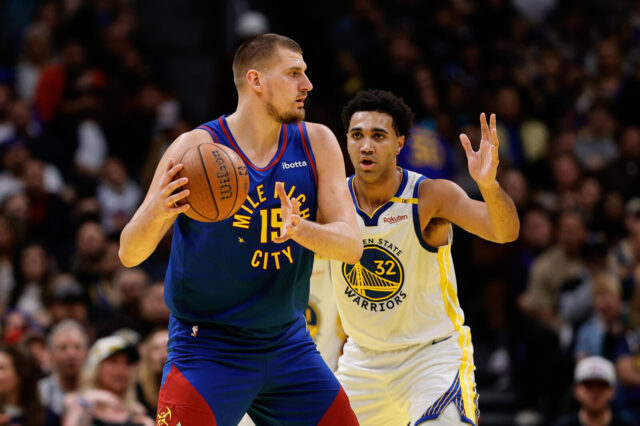Let’s get right into this thing:
So, our own Zach Mikash had a nice write-up on the news from Mike Singer of the Denver Post that Will Barton is out indefinitely with the knee soreness he has been dealing with for the last few weeks. Barton just hasn’t progressed the way that he and the Nuggets have hoped. He would be extremely helpful in a series against the Utah Jazz as an option to bolster Denver’s wing rotation in this series, but it doesn’t look like he’s physically ready to contribute.
As for Gary Harris, the only reason his right hip strain isn’t more concerning than Barton’s knee soreness at the moment is that we’ve been given a verdict. It certainly feels like Harris isn’t close to returning. He didn’t suit up in any of the scrimmages, missed all eight seeding games, and has yet to have an update other than ‘out’ on the injury report. Until that last part changes or Michael Malone comments on his improved physical condition, I will continue to believe he’s out for at least the Jazz series and maybe beyond that.
I thought the Jazz did a great job of walling off passing lanes, back cut opportunities, and most of the normal Jokic assist opportunities we are used to seeing from him. They took him out of his rhythm as a passer, and it was almost more impressive than anything that he responded with an efficient 29 points and making four three-pointers. Often, Jokic tries to force passes trying to create something that isn’t there if he goes a long time without making a play for someone else. On Monday, he took what was given to him.
The goal for Denver should be to find new ways to create those back cut opportunities, from experimenting with different timing to entirely different cuts. For example, using Porter as a decoy to cut to the rim on the strong side and then looking for a different cut on the weak side of the play. Whatever the Nuggets decide to do, they must continue to work for those shots. Jokic will find the pass.
It’s pretty evident that Denver’s bench is going to be big in this series if Gary Harris and Will Barton are out. Putting aside the fact that losing players creates opportunities, the Jazz specifically are a great matchup for the three players you specified. Let’s talk about each of them:
PJ Dozier is one of Denver’s best perimeter defenders at the current moment. Donovan Mitchell is pretty good. Injuries will beget opportunities for Dozier to defend Mitchell, Mike Conley when he comes back, and Jordan Clarkson in his normal rotation off the bench. If he can hit spot up threes and make good decisions with the ball, he’s going to be a big piece for Denver in these playoffs.
Monte Morris had to have a sigh of relief after seeing multiple threes go down in Game 1. If he’s this same confident version of himself for the rest of the series, the Nuggets may be looking at their version of Fred VanVleet on the Toronto Raptors championship team last year. He’s an excellent role player that makes plays exactly when he needs to and can remove some pressure from the starters.
Jerami Grant is a guy that I defended all season as a player with the athleticism and versatility to make a major playoff impact. Right now, he’s Denver’s fourth best player in the bubble and third on a bad day from Michael Porter Jr. He struggled defensively in Game 1 against Mitchell but improved in the overtime period. If he continues to be the do-everything player (outside of rebounding which is a concern) that the Nuggets need to change the flow of games, that’s a big deal for Denver in this series and potentially going forward.
I think Nikola Jokic is going to have to have his three-pointer going against Rudy Gobert. With the way the Jazz operate on pick and roll defense, Gobert drops inside the three-point line on most occasions to give help to Jamal Murray’s defender. When Jokic pops to the three-point line, he’s often open if Murray feels Gobert sliding over to help too far.
If the threes are open, Jokic has to take them. That’s the way to break “drop” coverage. The Orlando Magic did the same thing on Tuesday, winning against the Milwaukee Bucks because Nikola Vucevic (good friends with Joker) scored 35 points with 21 of those coming on jump shots outside the paint. The Jazz and Bucks play defense in a similar way due to the nature of their rim protectors on the floor, so the Nuggets are going to have to make outside shots at all moments if they want to keep the pressure on.
Here are two great examples of drop coverage by the Utah Jazz and two great shots generated from it by Jamal Murray and Nikola Jokic:
I don’t envy Jamal Murray right now. He has a lot of pressure on his (suddenly much bigger) shoulders to balance his own personal scoring and integrating others into the offense. Against the Jazz in Game 1, Murray had 16 “potential” assists as tracked by the main NBA website, which basically charts how many opportunities he creates for his teammates throughout the game. That’s one of the higher (if not highest) totals of his career.
Denver’s role players in this one shot the ball well. They weren’t insanely good though. Outside of Murray, Jokic, and Porter, the Nuggets shot 9/18 from the three-point line. That’s 50%, but even if the supporting cast makes just 6/18 (33%), the Nuggets are still shooting nearly 19/41 from three because their star players are confidently making threes. I trust that trend to continue because I trust the collective talent of Murray, Porter, and Jokic.
It’s a really fascinating question. The great thing about having strong depth to surround two star players is the ability to morph to different situations. When games get down to crunch time, the Nuggets may have to assume a different form than they normally do. As long as they have the requisite pieces to match up, they usually come out better than the average team.
Going forward, I think the Nuggets utilize Jamal Murray, Monte Morris, Torrey Craig, Jerami Grant, and Nikola Jokic as their primary closing group. Murray and Jokic are givens, and I think Craig and Grant are also givens barring foul trouble or an incredibly poor shooting performance. The perimeter defense those two offer on Mitchell and Ingles respectively is invaluable. The fifth spot is up for grabs, but if Jordan Clarkson and Royce O’Neale are on the floor in crunch time, give me Monte Morris, a better player than either of those two, as the stable fifth option who can do a bit of everything needed for winning basketball.
Not having Michael Porter Jr. out there may hurt the offense at times, but until he proves he can handle the pick and roll coverages the Jazz are throwing at him defensively, I don’t think Malone goes with him. Whatever Nuggets fans may think, it’s probably the right call, especially if he’s still getting 25+ minutes of playoff experience every night as a rookie. At one point, there was a major question of whether he would even get on the court. Him getting major playoff minutes already is a big time win for the Nuggets down the line, maybe even later this series.
Let me point to Arturo Galletti’s statistical model to aid in my answer:
In the second to last column, the Nuggets-Jazz series is decidedly weighted in Denver’s favor based on the number of simulations used. 88.4% to win the series is extremely high, and given what we saw from both teams in Game 1, I tend to trust the numbers. Despite the fact that Denver’s role players shot a high percentage, Mitchell isn’t going to score 57 again, and the Nuggets having two of the top three players in this particular matchup matters.
Right now, the Nuggets winning in five games is the most likely outcome, according to the simulation. I don’t think things should be weighted so heavily in Denver’s favor, but historically, the team that wins Game 1 wins the series 71% of the time. Denver was a part of the other 29% in last year’s playoff matchups, but I think this year will balance that out for Denver.
If the Nuggets win Game 2, I think the series goes five games. If the Jazz win Game 2, I think it goes 6 or 7. Point differential has little bearing for me personally. The Jazz are always going to keep things close because of bad Nuggets defense, but Denver’s star tandem consistently generates great shots when they are needed most, and that matters.


